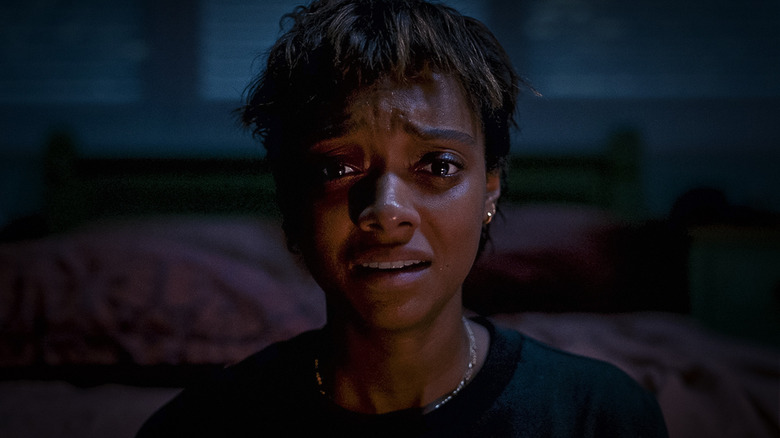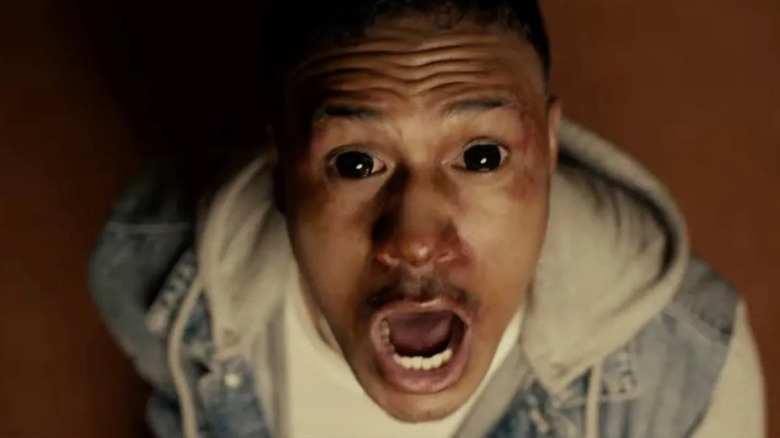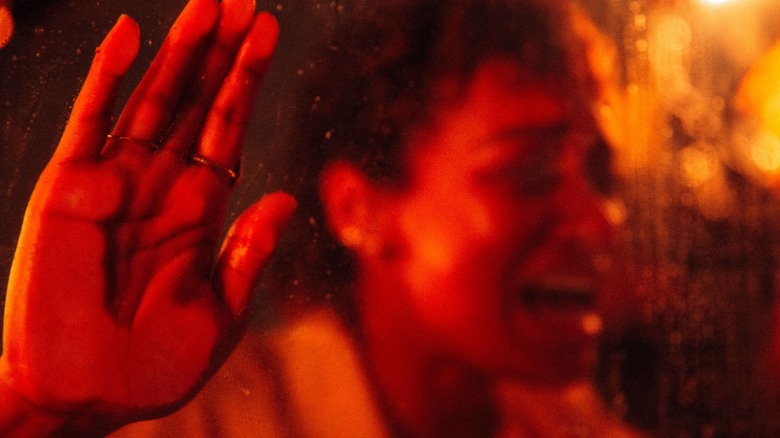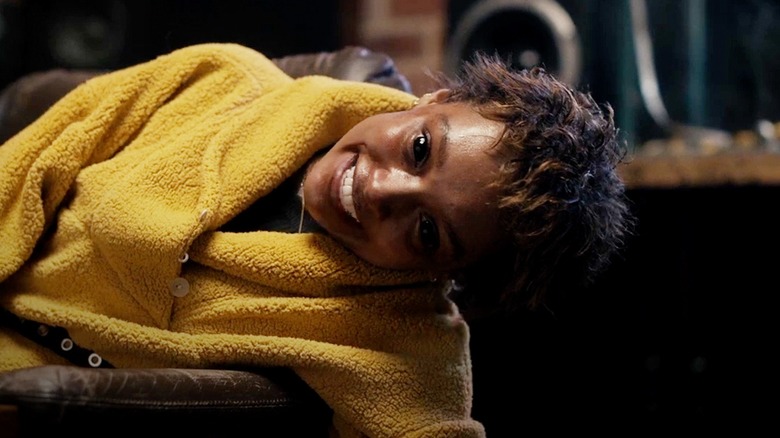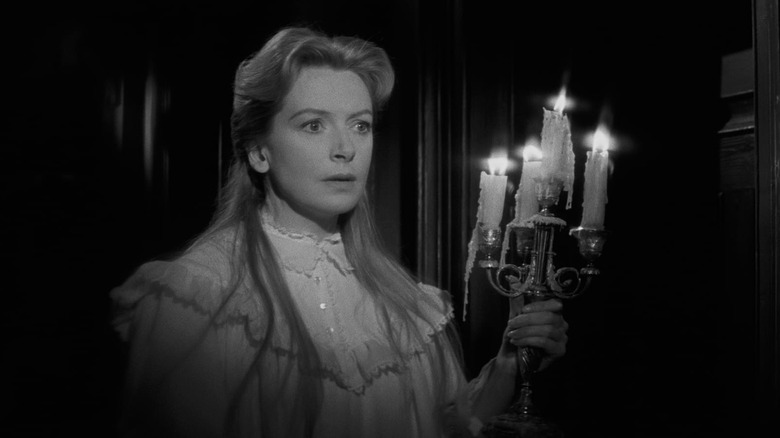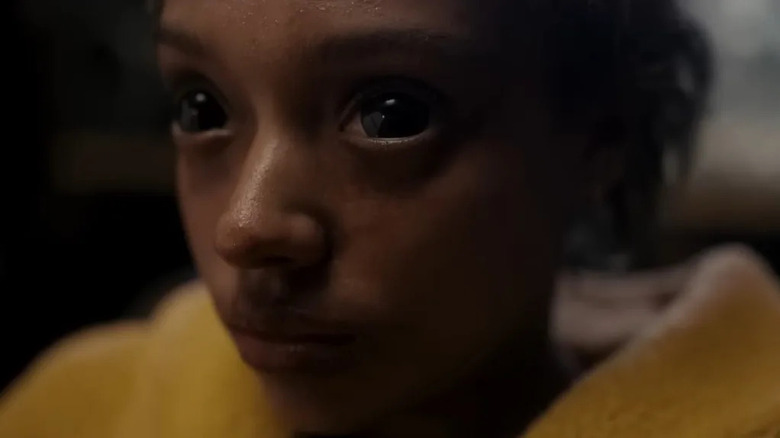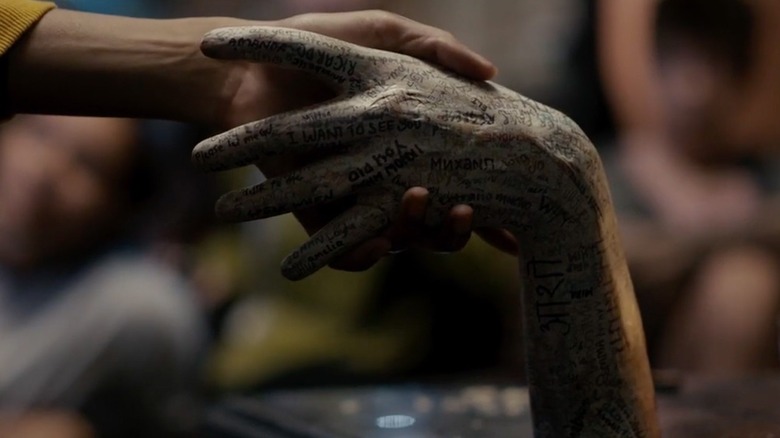Talk To Me Ending Explained: My Handshake Brings All The Souls To The Yard
This article contains spoilers for "Talk to Me."
Loss and grief bring a lot of changes to one's life, more than it may initially appear. It's a personal, grim reminder of the final destination that awaits us all, a full-on wake-up call that it can and will happen to you. As much as a death by natural causes hangs over every human being, the specter of unnatural death looms even larger; not just for reasons of unfairness, but because it implies an additional amount of pain and suffering coming along with it.
Thus, it's a natural impulse for most people (and especially young people) to not so much confront their fears but to dismiss, belittle and mock them, in the hopes that they'll be sufficiently diminished. In YouTube stars Danny and Michael Philippou's debut feature, "Talk to Me," the world of the dead is treated as something to be laughed at, the ability that a mysterious ceramic hand has — allowing those who touch it to communicate with dead souls — turned into a literal party trick.
Of course, this being the horror genre, such transgression will not stand, and a handful of Australian teens learn this the hard way. While the general premise of "Talk to Me" may seem predictable and by the numbers, the script by Danny Philippou and Bill Hinzman ingeniously turns the tables on the audience as much as it does the characters, hiding its insidious game within a more rudimentary narrative and leading to one of the most powerfully eerie endings in recent memory.
Just say no (to seances)
"Talk to Me" begins by establishing the lives of Mia (Sophie Wilde), her best friend, Jade (Alexandra Jensen), Jade's younger brother, Riley (Joe Bird), and Jade's boyfriend, Daniel (Otis Dhanji). The bonds between these people are complicated right off the bat: Mia has essentially become a de facto sister to Jade and Riley after the untimely, tragic death of her mother, Rhea (Alexandria Steffensen) which has caused her father, Max (Marcus Johnson) to become distant. Daniel used to be Mia's boyfriend (albeit for a brief time), and Jade and Riley's mother, Sue (Miranda Otto) cares for Mia but is a little wary of her, given the girl's history with drug use.
That latter point becomes the film's initial allegory, as Mia, enticed by numerous social media posts from recent parties where the mysterious ceramic hand is being used, convinces Jade and an all-too-eager Riley to attend one of these parties, hosted by the hand's current owners, Hayley (Zoe Terakes) and Joss (Chris Alosio). It's here that the rules of using the hand are established: the participant must be tied down while they grab the hand, a candle must be lit to "open the door" (and be blown out at the end), the person must say "talk to me" to establish contact and then say "I let you in" so that the soul will inhabit their body. However, this possession must not go on for longer than 90 seconds, lest the souls decide they'd like to stay in their new shell.
All this ceremony establishes the movie's seance-like ritual, yet it also applies to the metaphor of drug or substance abuse: doing something knowingly risky in supposed moderation. Sure enough, Mia's first outing with the hand causes her to see the spirit of a muddy, soaked old woman whom she lets in for just a few seconds too long.
Final destination, too
Like any substance abuse, Mia and her friends initially assume their playing around with the spirit world is fully under their control, and as such they start to get bolder and more irresponsible with it. Eventually, the too-young Riley insists on proving his maturity by joining in, and Mia (in the role of cool older surrogate sister, after Jade refuses) tacitly agrees. Mia is tricked into allowing Riley to linger past the 90-second barrier when it appears that her dead mother is inhabiting the boy, only for Riley to start violently harming himself, which Mia and the others are able to stop just before he's about to kill himself.
While Jade and Sue take Riley to the hospital, a shaken Mia goes home with Daniel, the two sharing a platonic bed for the night. As Mia has a disturbing nightmare-vision of the old soggy woman sucking Daniel's foot, she awakens to discover it's actually her doing the foot-sucking, an incident which leads Mia to believe that the dead have followed the partiers back from the other side.
Mia, Jade, Daniel, Hayley, and Joss eventually learn that the hand not only may have originally belonged to a medium, but that its real function is to capture the souls of those using it. This revelation puts the film in line with prior "don't mess with death" parables, particularly "Flatliners" and the "Final Destination" franchise, both of which feature characters cheating death only to find that death will not let them go.
The possession movie
One of the biggest strengths of "Talk to Me" lies in the way it blends a number of tropes from other horror films and simultaneously indulges in them while subverting them. Beginning with the "cheating death" movie, it then introduces tropes borrowed from the "possession" movie, as Jade discovers that Riley is still attempting to harm himself while under the control of the spirit inhabiting him.
The gang's first idea to help Riley is to hold another ceremony with the hand, as there's a question of whether or not the candle was blown out (thus shutting the door to the other side) during the chaos of Riley's initial possession. The remarkable amount of tension generated during this moment comes partly from the Philippous knowing that it's a riff on the classic exorcism scene. However, instead of a possessed Riley lashing out at his friends, the spirit of a young girl speaks to Mia, showing her that Riley's soul is in a state of constant torment, held back by the various spirits of the dead. This leads Mia to believe that there's only one true way to save Riley, which is to end his misery by ending his life.
The unreliable heroine
However, while this information is initially entertained due to Mia's status as the film's protagonist, the Philippous have given us ample cause to suspect Mia's mental state as her visions of her dead mother are increasing. Mia's mounting hysteria, fearful that she's the only one who sees the truth of what's happening and is more than willing to take some troubling steps to stop it, puts her in line with other unreliable horror heroines, most pointedly Miss Giddens (Deborah Kerr) from "The Innocents" (who becomes similarly convinced that she's a righteous protector of endangered children) and Marie (Cécile de France) from "High Tension" (whose actions in reality are different from how she perceives them).
Like any great horror film, "Talk to Me" revels in this ambiguity, as it's possible Mia may be more right than wrong. The biggest red flag comes when her father confesses that Rhea did indeed commit suicide, even going so far as to leave a note, an explanation that Mia not only rejects but begins to twist into her father covering up for his murder of Rhea. Seeing her father attempt to attack her (which the Philippous make sure to show he's not actually doing), she kills him instead.
On top of this, the Philippous add another layer of mystery, involving Mia seeing and hearing further glimpses of the soggy woman from her initial encounter with the hand. This progresses along with her visions of Rhea, as the mother's spirit looks more and more damp and muddy. Thus, it's not hard to theorize that all of these visions were not of her actual mother, but the soggy woman's spirit using her as a disguise in order to cause more pain and suffering through Mia. As Mia abducts Riley from his hospital room, she attempts to follow the orders of "Rhea" and push the boy into traffic.
You've gotta hand it to her
The film's ambiguity continues to crop up in its final moments, as Mia is about to push Riley into a busy highway while Jade struggles to reach and stop her. Cutting rapidly to a random car on the road which then has a violent accident, we see the vehicle has hit Mia, not Riley. Did Mia finally realize the influence of the evil spirit upon her and throw herself into traffic? Or did Jade reach the duo in time, pushing the possessed Mia away from her injured brother?
We're not sure, but neither is Mia, who stands up after the accident, wounded but cognizant. Almost immediately, reality begins to fall away, as no one around Mia speaks or sees her, and she finds herself back inside the hospital almost instantaneously. Time starts to melt along with reality, as Mia sees a now-healed Riley leave the hospital with Jade and Sue, while her father walks forward into a dark hallway without looking back. As the lights of the hospital begin to shut off around her, Mia is then enveloped in darkness until a soft light beckons her forward. She heads toward it and eventually finds herself holding hands with a strange man surrounded by his surprised-looking friends and speaking a Latino language. Sure enough, the man says the magic words — "I let you in" — and Mia gasps.
She died in the road incident, a fate similar to a deer she and Riley came upon at the beginning of the film. She couldn't face the harsh reality of death then, leaving the suffering deer to die, and the evil spirits of the hand used that to try and seduce her into killing Riley. Now death surrounds her, and she is forever trapped in the realm of the dead — not to mention bound by the rules of the hand.
A franchise starter?
"Talk to Me" is ultimately a story about grief, loss, and Mia's fear of death consuming her in all manner of ways, and its commitment to exploring these heady, heavy themes keeps it in that A24 "elevated" space. While A24 has a long history of backing horror films, producing and distributing the likes of "The Witch," "Lamb," "Hereditary" and so on, they haven't sequelized any of these movies. Until, that is, last year's surprise prequel to Ti West's "X," "Pearl."
Given the success of those two films, it's entirely likely that A24 may see franchise potential in "Talk to Me." After all, as the ending implies, the hand has changed owners, and it's possible that the series could continue as an anthology following the hand from person to person, or even that Mia could become, in reverse James Cameron fashion, the ghostly antagonist of the next installment.
Whatever the case ends up being, the fate of Mia and the central theme of "Talk to Me" is as abundantly clear as its ingenious central device: if you don't just have a brush with death but actively shake hands with it and let it inside you, it will claim you, and whether you're still breathing or not won't matter.
